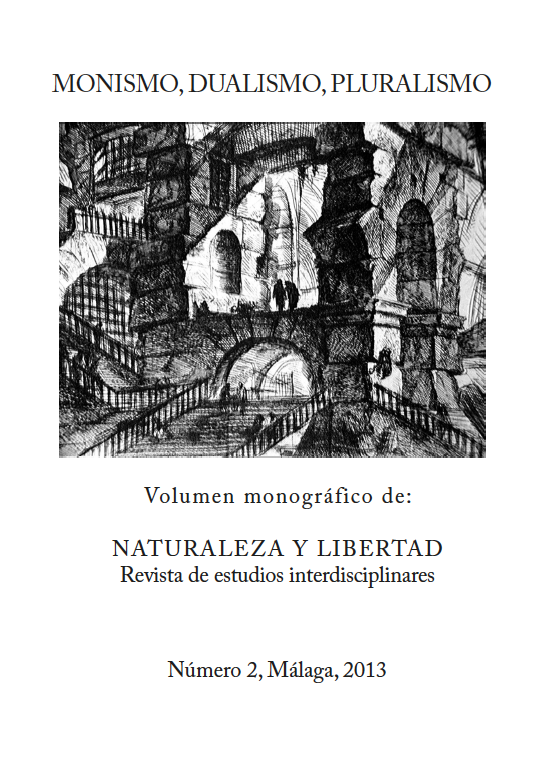La imposible travesía del naturalismo entre el dualismo y la irrelevancia de lo mental
DOI:
https://doi.org/10.24310/nyl.v2i1.3994Keywords:
naturalismo, mente, cerebro, dualismo, escepticismo, Plantinga, Dennett, Chalmers,Abstract
Resumen: En este artículo se defiende la tesis de que la concepción naturalista de la mente es un planteamiento inestable, que tiende a derivar en uno de estos dos extremos opuestos e indeseados por el pensador naturalista: dualismo y escepticismo. Cuanto más se esfuerza un autor por evitar el epifenomenalismo de lo mental, con más sustantividad —y, por ende, autonomía frente al cerebro— nos presenta la mente; cuanto más se esfuerza por evitar el dualismo, tanto más superfluo e irrelevante se convierte el ámbito del pensamiento. Este resultado arroja serias dudas sobre la viabilidad de la concepción naturalista de la mente.
Palabras clave: naturalismo, mente, cerebro, dualismo, escepticismo, Plantinga, Dennett, Chalmers
Abstract: This article defends the thesis that the naturalistic approach to mind is an unstable approach, which tends to lead to one of two opposite views: dualism or scepticism. (But both views are “abhorrent” for the naturalistic thinker). The more an author strives to avoid the epiphenomenalism of the mental, the more substantivity must be given to the mind. Thus the mind becomes more and more autonomous from the brain. On the other hand, the more he strives to avoid dualism, the more superfluous and irrelevant becomes the realm of thought. This result casts serious doubt on the viability of the naturalistic approach to mind.
Keywords: naturalism, mind, brain, dualism, skepticism, Plantinga, Dennett, Chalmers
Recibido: 02/11/2012 Aprobado: 18/04/2013
Downloads
Metrics
References
ARANA, J, Los Filósofos y la Libertad, Madrid, Síntesis, 2005.
BEILBY, J. K. (ed.), Naturalism Defeated?: Essays on Plantinga's Evolutionary Argument Against Naturalism , Ithaca, Cornell University Press, 2002.
CHALMERS, D., The Conscious Mind, Oxford, Oxford University Press, 1996.
CORREDOIRA, M., Somos Fragmentos de Naturaleza arrastrados por sus Leyes, Madrid, Vi¬sión Net, 2005.
DENNETT, D., La Conciencia Explicada, Barcelona, Paidós, 1991.
—, La Evolución de la Libertad, Barcelona, Paidós, 2004.
—, Dulces sueños: Obstáculos filosóficos para una ciencia de la conciencia, Madrid, Katz Edi¬tores, 2006.
DIÉGUEZ LUCENA, A., La Evolución del Conocimiento, Madrid, Biblioteca Nueva, 2011.
PAPINEAU, D., «Naturalism», Stanford Encyclopaedia of Philosophy, 2007. Disponible en: http://plato.stanford.edu/entries/naturalism/
PAUEN, M., Grundprobleme der Philosophie des Geistes, Frankfurt, Fischer, 2005.
ROBB, D., «Mental Causation», Stanford Encyclopaedia of Philosophy, 2003. Disponible en: http://plato.stanford.edu/entries/mental-causation/
RYLE, G., The Concept of Mind, Chicago, University of Chicago Press 1949.
YOO, J., «Mental Causation», The Internet Encyclopaedia of Philosophy, 2006. Disponible en: www.iep.utm.edu/m/mental-c.htm
Downloads
Published
How to Cite
Issue
Section
License
Those authors who have publications with this journal, accept the following terms:
1. Copyright and licensing information are clearly described on the journal’s web site: all content published in Naturaleza y Libertad is open acces without limit, and are subject to the Attribution-NonCommercial-ShareAlike 4.0 International (CC BY-NC-SA 4.0) license. The full text of which can be consulted at https://creativecommons.org/licenses/by-nc-sa/4.0/
2. It is the responsibility of the authors to obtain the necessary permissions for the images that are subject to copyright. The authors whose contributions are accepted for publication in this journal will retain the non-exclusive right to use their contributions for academic, research and educational purposes, including self-archiving or deposit in open access repositories of any kind. The electronic edition of this magazine is edited by the Editorial de la University of Malaga (UmaEditorial), being necessary to cite the origin in any partial or total reproduction.
3. This journal allows and encourages authors to publish papers on their personal websites or in institutional repositories, both before and after their publication in this journal, as long as they provide bibliographic information that accredits, if applicable, your posting on it.
4. In no case will anonymous papers be published.





18.png)













